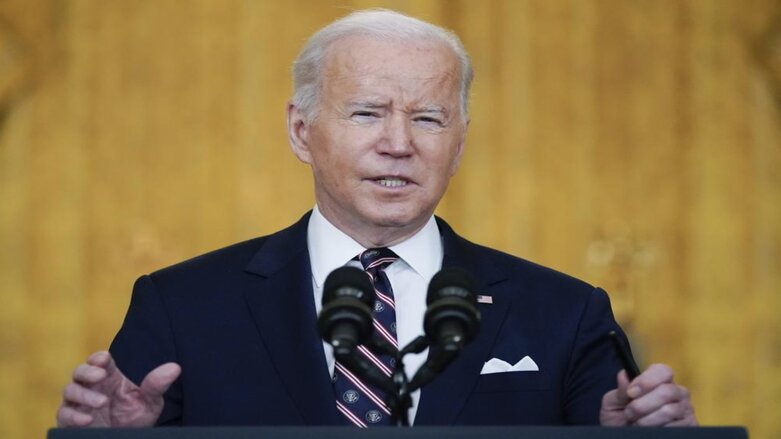Ukraine crisis heats up as threat of sanctions fails to deter Putin

WASHINGTON DC (Kurdistan 24) – US President Joe Biden declared the movement of Russian "peacekeepers" into eastern Ukraine ordered by Russian President Vladimir Putin on Monday an "invasion," as he announced the imposition of new US sanctions on Russia in a televised address on Tuesday.
That position represented a markedly tougher stance than first taken by the administration, which had declined to call the Russian troop movements an invasion significant enough to trigger major sanctions on Monday.
NATO Secretary-General Jens Stoltenberg also rang alarm bells on Tuesday, calling the present time "the most dangerous moment in European security for a generation."
For his part, Putin escalated his position after he recognized the two breakaway regions of Ukraine, the so-called Luhansk and Donetsk People's Republics. The pro-Russian separatists control only parts of Luhansk and Donetsk.
On Tuesday, Putin announced, "We have recognized all their fundamental documents—including their constitutions, which describe their borders as those of the Luhansk and Donetsk oblasts [provinces], when they were part of Ukraine."

It is widely believed that Putin's statement signals his intention to help the separatists take complete control of the two provinces.
Biden also announced that he had authorized "additional movements of US forces and equipment already stationed in Europe" further east "to strengthen our Baltic allies—Estonia, Latvia, and Lithuania."
The three countries border Russia, and they are particularly concerned about Russia's aggression toward Ukraine.
Among the demands Putin has made in the context of the Ukraine crisis is that NATO essentially reverts to the membership it had in May 1997, before the first eastern European countries joined. The three Baltic states joined the defense alliance in 2004.
Secretary of State Antony Blinken canceled a meeting with Russian Foreign Minister Sergey Lavrov scheduled to take place on Thursday. He had agreed to the meeting last week on the condition that Russia not invade Ukraine.
The European Union, Britain, and Canada also announced sanctions on Russia. Notably, Germany agreed not to activate the Nord Stream 2 pipeline, designed to carry natural gas from Russia to Germany. It was completed in September, but it has yet to be certified for use. That key German decision had been in question, as Germany had appeared hesitant, even as Biden had affirmed it would happen.
The Biden administration is also imposing export controls on key equipment, including electronics, which Russia imports. Singapore, Japan, and Taiwan have all agreed to that.
Won't Stop Putin—Further Military Action Likely in Coming Days or Weeks
In his address on Tuesday, Biden did not seem optimistic that the sanctions he was announcing would stop Putin. He described Putin's move into the separatist regions as "the beginning of the Russian invasion of Ukraine" while affirming, "If Russia goes further with this invasion, we stand prepared to go further with sanctions."
If you don't think something will work, why not do something else? Or take stronger action?
Lt. Col. Alexander Vindman (US Army, Retired) was born in Ukraine and covered Ukraine in Donald Trump's National Security Council (and testified against Trump in his second impeachment hearing). He critiqued US policy on Tuesday evening on CNN.
"Those are meaningful sanctions," Vindman said, and they "will catch the Russians' attention."
But he also complained that the Biden administration was being reactive rather than proactive. 'If you do this, we will do that,' the administration is telling Russia, so the sanctions are a punitive reaction rather than a deterrent action.
"If we know for certain that the Russians are getting ready to engage in a major offensive, we probably should be preparing our European allies to defend themselves or at least to signal that the US will be there behind them," Vindman said.
"That means force posture changes, not in response to Russian aggression, but proactively and the same thing with regards to arming the Ukrainians," he continued.
Vindman also stated that it is "militarily not viable" for Putin to keep a large force—of nearly 200,000 troops—in the field for "weeks and weeks on end." The equipment needs maintenance, and troop morale becomes an issue as time passes.
Vindman suggested that Putin would soon move to take control over the entirety of the Donetsk and Luhansk oblasts, and then he would use them as the staging ground for a massive offensive on Ukraine as a whole.
"The position of the forces there, Vladimir Putin's rhetoric, indicate that action is coming," Vindman concluded.
